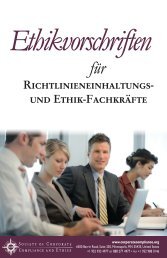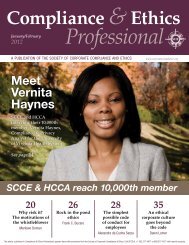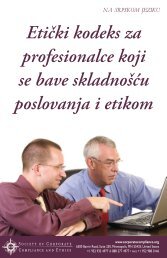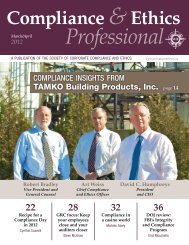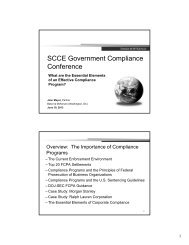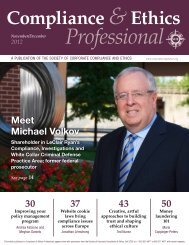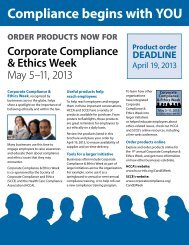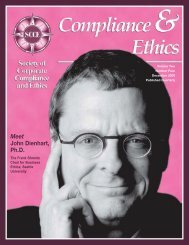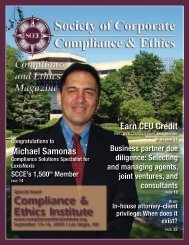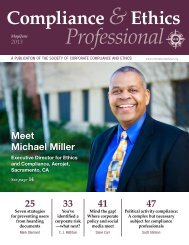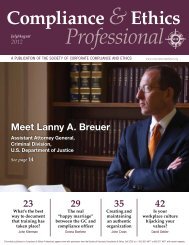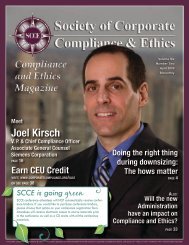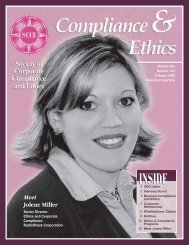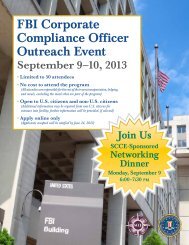Compliance &Ethics - Society of Corporate Compliance and Ethics
Compliance &Ethics - Society of Corporate Compliance and Ethics
Compliance &Ethics - Society of Corporate Compliance and Ethics
- No tags were found...
You also want an ePaper? Increase the reach of your titles
YUMPU automatically turns print PDFs into web optimized ePapers that Google loves.
The prosecutors’ perspectiveThe Thompson Memor<strong>and</strong>umThe federal Department <strong>of</strong> Justice (DOJ) in2003 indicated how it intended to respond incases in which reliance on a corporate code<strong>of</strong> conduct was an intricate part <strong>of</strong> the culture<strong>of</strong> a company suspected <strong>of</strong> having violatedthe law. The DOJ statement—known as theThompson Memor<strong>and</strong>um, after the deputyattorney general over whose signature it wasreleased—lists nine considerations that federalprosecutors should take into account in decidingwhether to investigate, charge, or negotiatea plea with the organization. Three <strong>of</strong> the considerationsrelate to codes <strong>of</strong> conduct:1. The corporation’s timely <strong>and</strong> voluntarydisclosure <strong>of</strong> wrongdoing <strong>and</strong> its willingnessto cooperate in the investigation <strong>of</strong> itsagents, including, if necessary, the waiver<strong>of</strong> corporate attorney-client <strong>and</strong> workproduct protection;2. The existence <strong>and</strong> adequacy <strong>of</strong> the corporation’scompliance program; <strong>and</strong>3. The corporation’s remedial actions,including any effort to implement aneffective corporate compliance programor to improve an existing one, to replaceresponsible management, to discipline orterminate wrongdoers, to pay restitution,<strong>and</strong> to cooperate with the relevant governmentagencies. 24The Thompson Memor<strong>and</strong>um spelledout in some detail the ingredients <strong>of</strong> a corporatecode <strong>of</strong> conduct that should be takeninto account when determining the disposition<strong>of</strong> a case. The critical factors, it declared,are “whether the program is adequatelydesigned for maximum effectiveness inpreventing <strong>and</strong> detecting wrongdoing byemployees <strong>and</strong> whether corporate managementis enforcing the program or is tacitlyencouraging or pressuring employees toengage in conduct to achieve business objectives.”The Memor<strong>and</strong>um repeated that pointin other words as well: the aim would be todetermine whether compliance rules weremerely a “paper program” or whether they“were designed in <strong>and</strong> implemented in aneffective manner.”The fact that an infraction had presumablyoccurred which brought the companyto the attention <strong>of</strong> the authorities could, <strong>of</strong>course, challenge any claim <strong>of</strong> effective design<strong>and</strong> implementation. Besides, the words“adequately” <strong>and</strong> “maximum effectiveness”leave a good deal to be desired in regard topreciseness.The McNulty Memor<strong>and</strong>umThe emphasis on waiving attorney-clientprivilege <strong>and</strong> work project privilege aroused astorm <strong>of</strong> protest from business organizations<strong>and</strong> the defense bar. In late 2006, in an update<strong>of</strong> the Thompson Memor<strong>and</strong>um, assistantattorney general Paul McNulty added threeelements to the clause in response to criticisms<strong>of</strong> the guideline undercutting the traditionalattorney privileges. These were:1. A corporation can cooperate withoutwaiving its privilege if it can provide thenecessary information through other means.2. Waiver requests should be made only ifthere is a “legitimate need,” defined as “acareful balancing <strong>of</strong> important policy considerationsunderlying the attorney-clientprivilege <strong>and</strong> the work project doctrine<strong>and</strong> the law enforcements needs <strong>of</strong> thegovernment’s ‘s investigation.”3. Waiver requests require high-level supervisoryapproval, which varies dependingon the sensitivity <strong>of</strong> the information beingsought. 25It is, at best, arguable whether theMcNulty Memor<strong>and</strong>um will do much to keep<strong>Compliance</strong> & <strong>Ethics</strong> Pr<strong>of</strong>essional May/June 2012+1 952 933 4977 or 888 277 4977 | www.corporatecompliance.org 61



